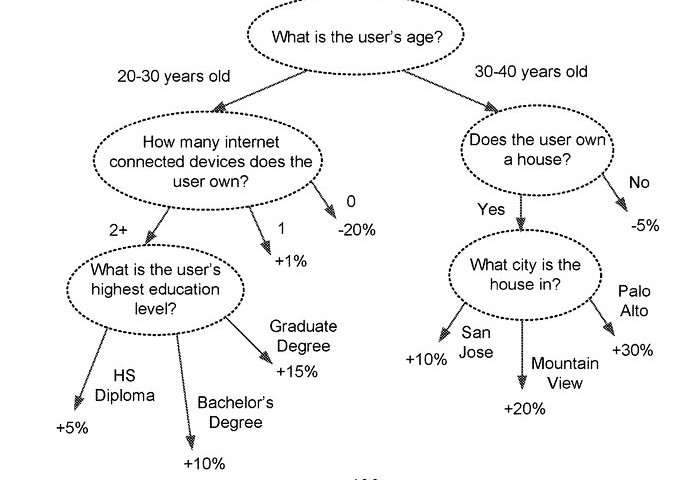February 6, 2018 weblog
Facebook patent talk: Seeing who is rich, poor, in the middle

"Socioeconomic group classification based on user features," is a title that evokes an uh-oh just as much as an oh-really.
Face It, there is sensitivity regarding actions designed to help marketers know the right targets for the right message that nonetheless may be interpreted as intrusive.
Well, that is a patent title. Facebook filed the patent in July 2016 and it was made public just recently. Facebook is interested in a system that can work out which socioeconomic tier defines you.
So, where do you stand on the socioeconomic totem pole? Working class, middle class, upper class? If you do not think of yourself as a socioeconomic classification, never mind. You don't need to bother coming up with the answer. Facebook has an algorithm in mind to find out.
Facebook is interested in a system that collects users' data. Education, home ownership and internet usage are pathways to predict a person's socioeconomic status.
"An online system uses classifiers to predict the socioeconomic group of users of the online system. The classifiers use models that are trained using features based on global information about a population of users such as demographic information, device ownership, internet usage, household data, and socioeconomic status. The global information can be aggregated from market research questionnaires and provided to the online system," according tot he patent discussion.
Tyler Lee summarized in Ubergizmo, describing the interest in "an algorithm that will use a bunch of data uploaded by the user to determine their socioeconomic status, such as your education, homeownership, internet usage, and more."
The boost for advertisers would be information they could use to serve up more relevant advertisements. That could assist third-party delivery of sponsored content to target users.
Tim Sandle is Digital Journal's editor-at-large for science news. He took a look at the patent news. "The collected information is used for targeted marketing purposes. Given that businesses that advertise with Facebook want to know more information about their customers, and how they can better reach them, the additional data analytics simply add to this purpose in finer detail."
Wait, though. Why bother to make this kind of effort when all you need to do is ask people to reveal their income?
Sissi Cao, business reporter for Observer, said Monday: "the social platform giant is developing an algorithm to figure out how much money you make—without outrightly asking the question."
"Facebook acknowledges that users might not be comfortable offering up how much they make per year," explained Annie Palmer in Daily Mail. "Facebook is side-stepping questions about income and using other personal data to make conclusions on its own."
A decision tree is a key factor in the design.
"Facebook outlined a sample decision tree that would use various data points in an information set, collected through questionnaires, to determine the likelihood of a person's socioeconomic status," Cao wrote. That is, said Cao, "all of this information will be fed into an algorithm called 'classifier' to predict the probability of a person's socioeconomic status in one of three groups: working class, middle class or upper class."
(Patent wording: "Examples of socioeconomic groups include working class, middle class, upper class, etc. Typically, a user's socioeconomic group is based on an income of the user. The online system can determine the probability that a user belongs to a socioeconomic group without necessarily using the income of the user.")
The tree would use data points that the platform collects, said CB Insights, e.g., whether or not the user is a homeowner, assigning probability values and predicting the class. Daily Mail said a decision tree begins classifying users based on their age. From there, it asks questions based on age group.
(Twenty- to 30-year-olds are asked how many internet devices they own, while 30 to 40-year-olds are asked whether or not they own a house, said Palmer).
Are you thinking along the lines of chinks in the analysis armor? It could be you can find people who did not go beyond high school education yet, through startup skills or talent, or moneyed parents, are in the upper income strata. It could be that someone you know is upper income yet does not own a home out of career travel needs or personal preference. It also might not be difficult to find someone you know who has lots of digital gadgetry, and shows a sophisticated use of the Internet, yet has low income.
Sophie Kleber, Harvard Business Review, while not addressing this patent, brought out an interesting perspective.
"Algorithms don't have a conscience; they repeat what they learn. When algorithms repeat and perpetuate bias or opinion, we need to consider mathwashing."
In the bigger picture, CB Insights remarked that "This patent also follows a series of other patents around emotion tracking, with Facebook seemingly trying to get more and more granular data about how their user base reacts to different ads, content, and more."
More information: Socioeconomic group classification based on user features, USPTO Applicaton #: #20180032883 , www.freshpatents.com/-dt201802 … 1ptan20180032883.php
© 2018 Tech Xplore




















